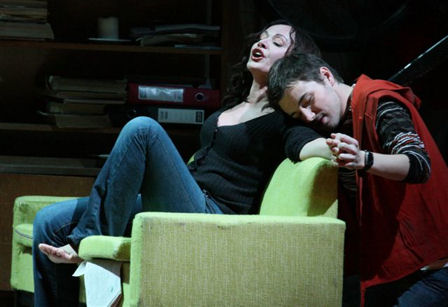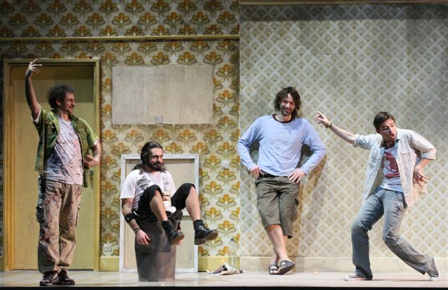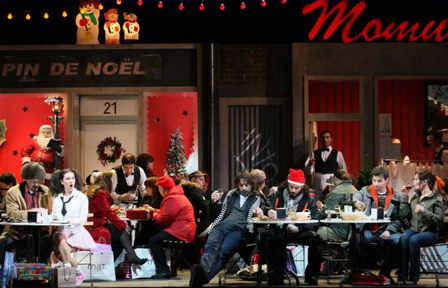Other Links
Editorial Board
- Editor - Bill Kenny
- London Editor-Melanie Eskenazi
- Founder - Len Mullenger
Google Site Search
SEEN
AND HEARD INTERNATIONAL OPERA REVIEW
Puccini, La Bohème:
Soloists,
GNO Orchestra and Chorus Conductor: Loukas Karytinos, Greek
National Opera, Athens 6.1.2008 (BM)
Graham Vick likes to explore familiar works on minor-league stages
with young casts, the perfect setting for directing what is
perhaps Puccini’s most popular opera. The composer himself once
said his music was that of “small things”, and it would almost
seem that Vick had this comment in mind in developing his take on
La Bohème. His Christmas gift to the Athens public was a
contemporary staging that was exceptional for the way in which it
succeeded in engaging its characters, amongst each other and with
the audience. There was absolutely no singing at each other at a
distance or from across the room for Rodolfo and Mimi - this
version allowed them to get quite physical (but fear not, no
clothing was removed.) Far from turning into one of those tedious
pseudo-modern productions out to condescendingly “shock” viewers,
the result was just plain romantic - though never sentimental -
and very poignant, with a final scene that was truly heartrending
(and many a humorous touch in between!)
Naturally, none of this could have been achieved without a superb
cast, and in particular the tremendous contribution of young
Sébastien Guèze as Rodolfo, who literally stole the show with his
glorious tenor, striking good looks and sensitive acting. (Have a
peek at this – you’ll see that he also has a good sense of humor:
http://www.youtube.com/watch?v=_-06INjcHKg). The “Lyric Artist
Revelation” title awarded to him in 2006 by the artists’
association ADAMI couldn’t be more aptly named, and I can only
recommend that opera houses looking to recruit exciting new voices
for future productions get cracking – chances are this one will
soon be booked solid. Mimi was sung by Elena Kelessidi, a fine
artist whose Eurydice of last season has left an enduring
impression - which is why I prefer to venture into the facetious
and put all her vocal pushing and sliding down to some chocolate
bars she was seen purchasing before the performance. Irini
Kyriakidou’s Musetta was crystal-clear and radiant – perhaps she
could have been cast in the lead role? As to the other men, Akis
Laloussis was an engaging Schaunard, while Kyros Patsalides did
exceedingly well as Marcello, his sonorous baritone reaching for
the higher register with great ease and panache, and another young
singer who undoubtedly classifies as a find is Tassos Apostolou,
who sang an exceptional Colline, making his mark from the minute
he first arrived on stage with his bicycle and giving an intensely
introspective rendition of the “coat aria” near the end.
Richard Hudson’s sets (especially the student abode-like lodgings
of Act I) and costumes did a good job conveying what the
surroundings of artists scraping out a living in some present-day
European city might look like - scanty, but never seedy - with the
possible exception of the women’s not-so-Bohemian footwear.



As always, GNO’s orchestra and the acoustics of the building
itself obviously have their limits. Mind you, I wouldn’t harp on
this if it weren’t for the fact that ticket prices here are more
expensive than at many leading European opera houses (for example
Berlin Staatsoper, where the most expensive seats for upcoming
performances of this very same opera are 80 euros, whereas here
they were a steep 110). Mercifully, Loukas Karytinos knows how to
handle all of this by now and coax a pleasant sound from his
musicians while doing his best for the singers, with whom he
clearly enjoys much well-deserved popularity.
In his cult film “La Vie de Bohème”, based on the same novella by
Henry Murger, Kaurismäki has his Rodolfo declare that “opera is a
dying art”. Luckily, this Athens Bohème proved that nothing could
be less true (even if some dying does go on at the end), by
imaginatively conveying what it is like to be young and in love.
Stefanos Lazaridis will be a difficult act to follow, but with any
luck his successor, GNO’s newly appointed artistic director
Giovanni Pacor, will have equally intriguing ideas up his sleeve
for forthcoming opera seasons.
Bettina Mara
Pictures © Stefanos
